How To Clean Gums With No Teeth
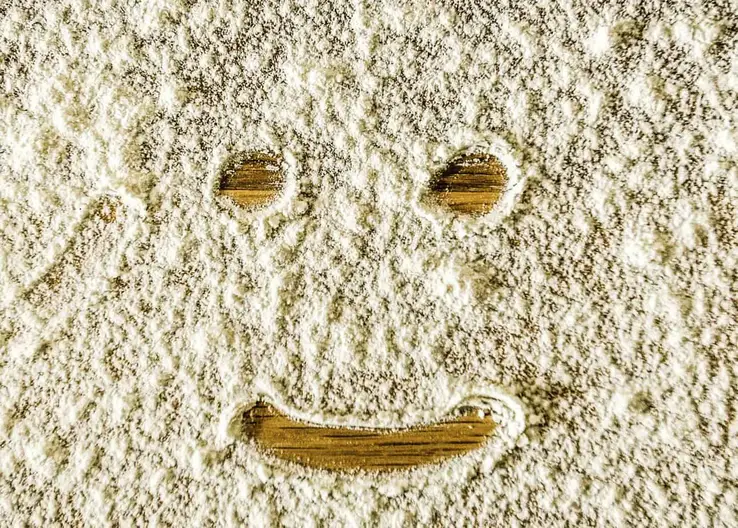
Even if you have no teeth, there are still lots of bacteria and yeast that are living and thriving in your mouth.
And just like when there's a full set of teeth, we need to keep the numbers of bacteria down to maintain optimal oral health and in turn overall body health. This could be for anyone at any age. Babies, teens, adults and the elderly.
To clean your mouth when you don't have any teeth you will want to use an extra-soft toothbrush and warm water. Brush the ridge of where your teeth used to be, your palate, tongue, and cheeks. Brush everywhere you can because the bacteria are everywhere.
Sometimes tooth loss can happen prematurely due to medical conditions or severe periodontal disease and in some rare cases, teeth don't form.
But most cases of no teeth (also known and edentulous) happen with older age when periodontal disease and decay result in tooth loss.
What surfaces to clean in your mouth
You want to get everywhere you can, this includes cleaning the gums, cheeks, palate and tongue. The more surface area that is cleaned, the more bacteria will be disrupted and removed.
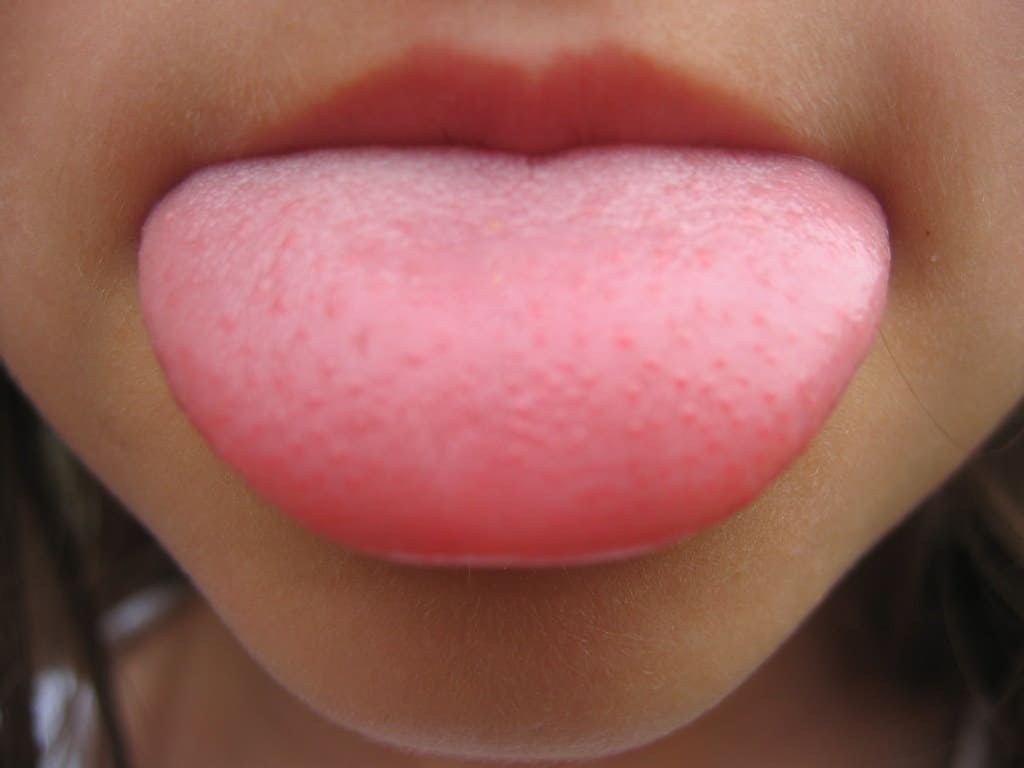
The most important thing to clean is the tongue. The tongue is like a shaggy carpet in your mouth, with both food particles and bacteria making the tongue their home. Tongue cleaning is often overlooked.
Related Post: How Often Should You Clean Your Tongue?
How to clean and what to use
Use an extra-soft toothbrush because the gum tissue is delicate. If you use a medium or hard toothbrush, it can abrade the surface of the tissue and cause damage. Also, the softer the bristles of the brush, the more they can bend and contour around the different edges in the mouth.
You can also use a clean, soft face cloth. Wet the cloth with warm water and wrap it around your pointer finger on your dominant hand.

There are some products that are specifically designed for cleaning mouths that have no teeth.
You can find a full list that I have put together with products that I recommend to my patients at the end of this post.
When to clean and how often
Ideally, this will be done after every meal because as soon as there is food in the mouth, the bacteria will start their feeding frenzy.
Food and drink can get trapped in the fold between the inner cheek and ridge of where the teeth used to be. This space should be focused on as the fold can extend higher than you think.
If dentures are worn, the dentures should be removed and rinsed off to get rid of food debris. I delve into denture care farther down in this post.

The bare minimum for cleaning your mouth out is 2 times a day. Once in the morning after you wake up, and right before you go to bed (after you eat). You don't want to consume anything but water after you clean your mouth at night when you go to bed.
Why you should be cleaning your mouth with no teeth
The bacteria that are present in the mouth have a huge effect on the rest of our body. When your mouth is not healthy, your body is not healthy.
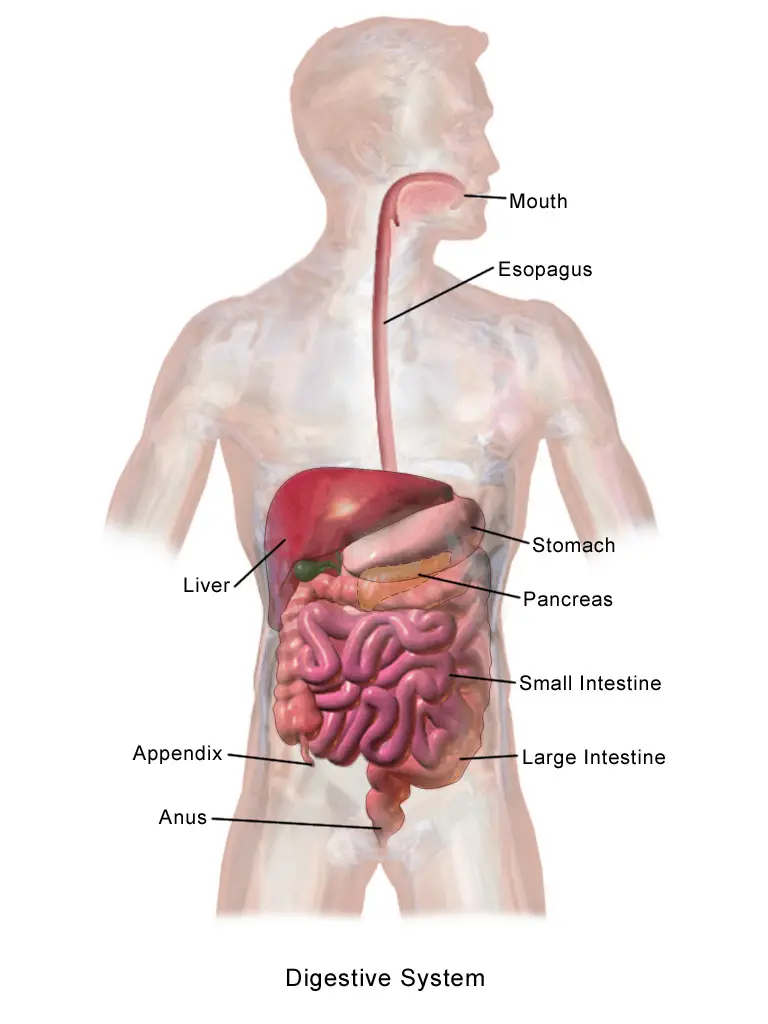
An unhealthy mouth can affect medical conditions such as diabetes and certain inflammatory diseases. If poor oral hygiene continues it can contribute to the medical conditions to be less controlled.
The medications that are taken to treat medical conditions can have a direct effect on your oral health as well.
There are over 500 medications that cause dry mouth, and bacteria and a dry mouth are not a pleasant combination.
The bacteria will irritate the gum tissue, further potentially causing uncomfortable sores and can contribute to the start of a yeast infection in the mouth (also called oral thrush).
Rinses
From the advertisements alone that we see on television and the internet, it seems like using mouthwash will solve all the world's problems including your mouths problems.
This just isn't true and mouthwash can disrupt the oral flora in your mouth, and even in this study, its chronic use is linked to the progression of diabetes. It can also be extremely irritating to the tissues and cause tissue sloughing.
Related Post: Tissue in Your Mouth Peeling? Causes and How to Stop It
The best thing to use is a saltwater rinse. You can find the perfect recipe here.
This will help heal any sores that the dentures may be causing. It also kills the bacteria in a safer way, preventing antibiotic-resistant bacteria.
Saltwater rinses pull the water out of the bacterial cell, killing it in the process.

Also, mouthwash can damage the outer coating on the dentures and irritate the tissues if you have dry mouth.
If you have an oral infection in your mouth, a dental professional may prescribe chlorhexidine gluconate. This rinse is a germicide that kills the bacteria in your mouth to help reduce inflammation and aid in healing.
Most people who don't have teeth wear dentures to replace their teeth. Although they are not real teeth, they should be treated like they are real teeth.
Caring for dentures like they are normal teeth will not only make the dentures last and fit well for longer but also keep your mouth and body healthy.
Denture Care
Denture care is so important because dentures are both a breeding ground for bacteria, but can also contribute to poor oral health.
Rinse dentures off after every meal

If they are not removed, the food that is stuck underneath the denture will rub between the tissue and the denture, potentially causing a painful abrasion/cut and a localized infection could start.
Especially harder foods that don't break down well such as seeds and popcorn.
This can become very painful for the person wearing the dentures.
I once had a patient who didn't remove his denture often, and I guess he ate something with seeds because the seed was sprouting!
Yes, you read that right… the seed germinated under his denture.
The tissues underneath his dentures were not in good shape and were painful just to look at. This ties in nicely with the next section of this post where I explain the importance of removing dentures at night.
Remove dentures at night
This is SO important. First, it prevents accidental choking or swallowing of the denture… it has happened. And don't think it won't happen to you, because anything is possible. Although it's more common to swallow partial dentures, full dentures that are cracked or broken have to potential to be swallowed.
Removing dentures at night lets your tissues breathe. We all know what our skin looks like when we have left a band-aid on for too long. The skin gets wrinkly and smelly.
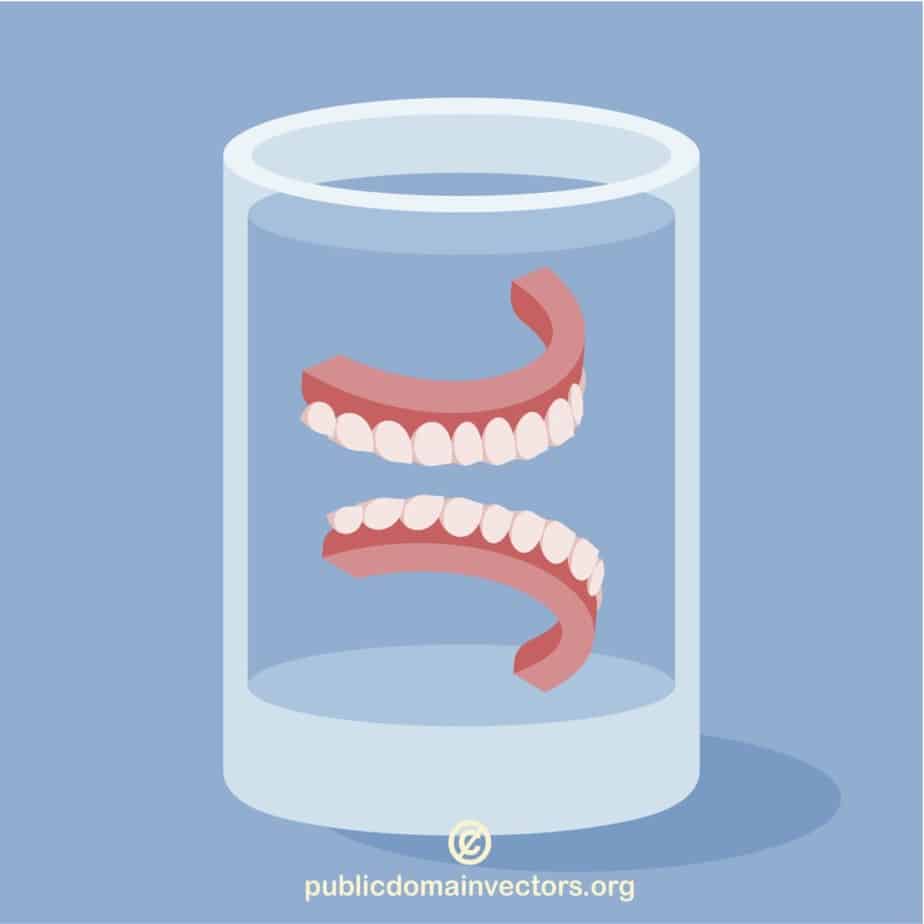
When the dentures are not removed for an extended amount of time, the tissues don't get that important time to recover.
This can lead to flabby tissue, which causes the denture not to fit properly which affects eating, speaking, and self-confidence. As well as an expensive fix and re-line or even a whole new set!
When dentures don't fit right, denture glue/adhesive is overused to help keep the dentures in place.
The overuse of denture glue/adhesive that contains zinc can contribute to nerve damage affecting the hands and feet. This article by the FDA explains further.
How to clean dentures
Just like the tissues in the mouth, dentures are the perfect breeding ground for the bacteria. It is important to clean them thoroughly and remove all the denture glue/adhesive prior to cleaning.
You want to remove all the denture glue/adhesive because it's an uneven surface that will trap bacteria, but also because it's soft, it will absorb bacteria.
So it ends up just being a messy bacteria-ridden glob.
The best way to remove the glue/adhesive from the denture and the gum tissue is to use a soft cloth that is dampened with warm water. Use gentle pressure with a circular motion to start breaking it up and loosening it.
*As a side note, dentures should fit without the use of glue/adhesive. If you have to use an excessive amount, it may be time to have your dental professional take a look at how they are fitting in your mouth.
If they're not a good fit, there are ways to adapt the dentures so they fit better, and you won't have to use the glue/adhesive, or drastically reduce the amount used.
After removing the glue/adhesive if you use it, you will want to use a specified denture brush to clean the dentures themselves. They are specifically designed for use on dentures.
You can just use warm tap water for this, no need to use toothpaste. You can find the denture brush that I recommend at the end of this post.
The majority of tubes of toothpaste have abrasives added in them that can scratch the surface of the denture.
Once they are brushed and cleaned you will want to soak them overnight, or whenever they are not in your mouth.
DO NOT SOAK IN MOUTHWASH, if I could repeat that a million times in this post I would…. But it would lead to a very bad read. The reason for this is outlined in the next paragraph.
Again I cannot stress enough, never soak your dentures in mouthwash. The mouthwash can start to cause microscopic pitting of the surface, which the bacteria will make their home.
Excess bacteria can cause bad breath, but also increase the chance of oral infection. These pits that are formed are so microscopic that one bristle of the toothbrush will not fit into that pit.
Soak in a denture cleaner that is made for the dentures. They are safe to use, and won't damage the surface.Denture tablets will help to dissolve tartar (calculus), plaque and stain and make it easier to brush away! It keeps the dentures clean, making your mouth healthier and happier!
Keep up with dental appointments
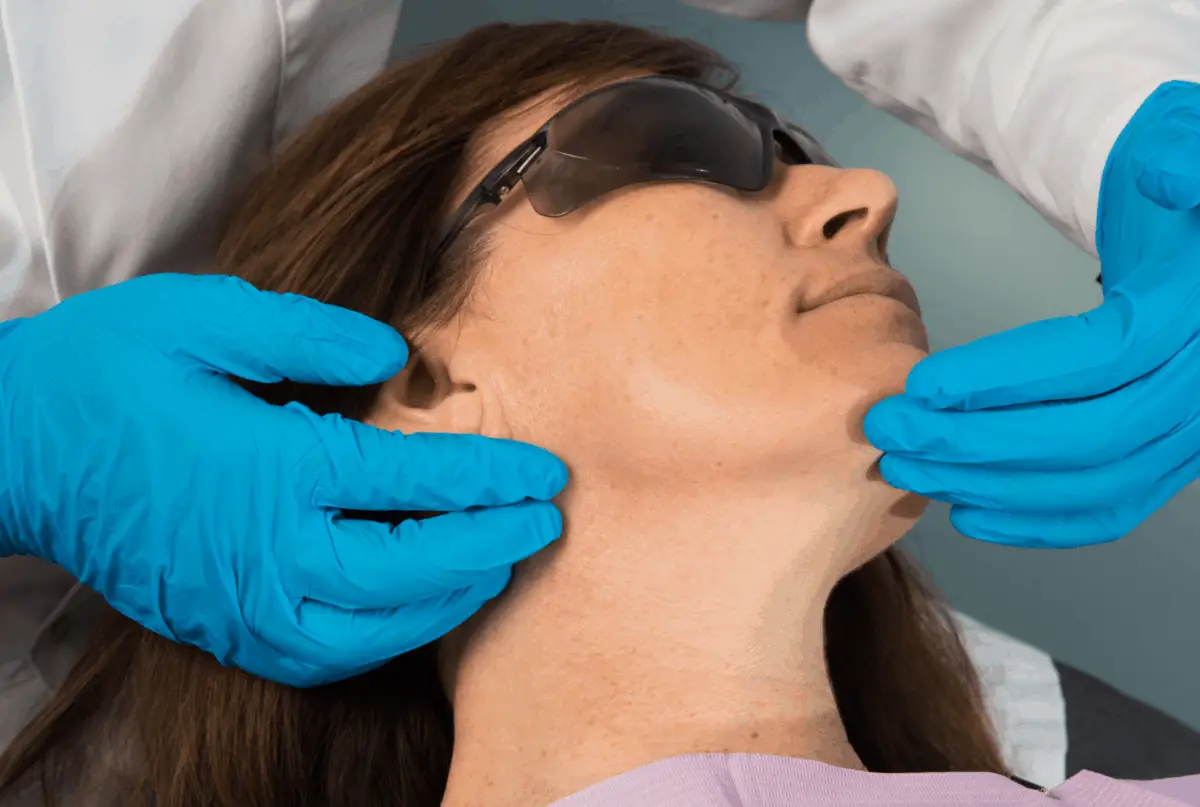
I have had patients who I've seen from when they had teeth and transition to dentures. And almost each one of them has said something along the lines of, "well I won't be having to come here on a regular basis anymore".
And that is not true.
They may not have to come as often, but they definitely have to keep up with a regular routine.
Related Post: How Dental Hygienist's Clean Your Teeth
People who have dentures still need to have these exams because we check for oral cancer, other oral conditions that could harm your overall health, and make sure the dentures are fitting well and not causing sores on the tissues.
A lot of serious medical issues will present in the mouth first.
I know a dental hygienist who prompted a patient to seek immediate medical attention because what she saw in her patient's mouth was typical signs of leukemia.
The patient did, in fact, have leukemia and if not for the dental hygienist, the patient would not have sought out medical treatment that early. And because it was caught early, the patient had a higher chance of beating it, and they did.
I hope you have found this post helpful!
Holly 🙂
How To Clean Gums With No Teeth
Source: https://www.mytoothbetold.com/how-to-clean-your-mouth-when-you-dont-have-teeth/
Posted by: coonscriniveran.blogspot.com

0 Response to "How To Clean Gums With No Teeth"
Post a Comment